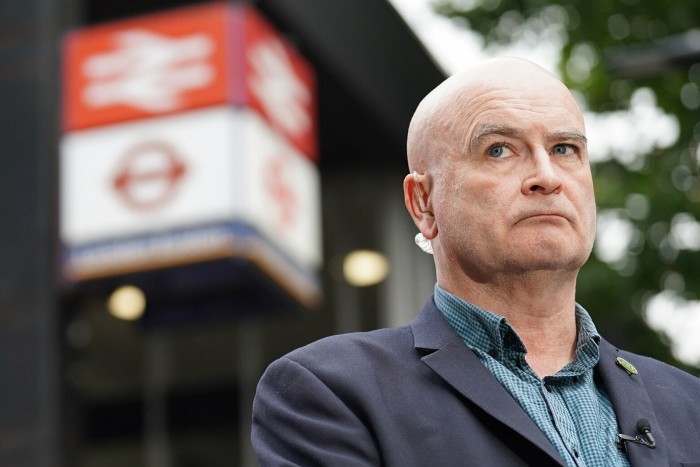The head of the RMT union on Thursday warned that passengers face an “indefinite” campaign of strike action on the UK’s railways unless the government and industry reach a negotiated settlement with workers.
RMT general secretary Mick Lynch wrote to Grant Shapps, the transport secretary, demanding ministers step in to end the long-running dispute over pay, working practices and job security, which saw only about a fifth of train services run in Britain on Thursday.
The walkouts by members of the RMT and TSSA were the latest in a wave of industrial action that has hit the transport network this summer, as unions push for significant pay rises to help members cope with soaring inflation though negotiations have stalled.
Lynch accused the government of prolonging the row for political reasons and warned that “the dispute will be prolonged indefinitely” as private train operating companies were shielded from loss of revenue on strike days.
The government assumed financial control of the railways in 2020, when the pandemic led to a sharp fall in passenger revenue, and has put companies on new tightly controlled contracts, whereby they are paid to run services.
“Your government has made the decision to use taxpayer’s money to bail out private train companies from being liable for revenue lost because of industrial action on the condition the same companies comply with government instructions to hold down pay, cut thousands of safety-critical rail jobs,” Lynch wrote.

In response, the Department for Transport said unions should “get off the picket lines and back around the negotiating table” to help end the strikes.
“All these strikes are doing is hurting those people the unions claim to represent, many of whom will again be out of pocket and forced to miss a day’s work,” it added.
Thursday’s strikes marked the start of three days of industrial action across the public transport network.
RMT members will on Friday close swaths of the London Underground and Overground networks when they strike for the fifth time this year in a separate dispute over pay and pensions with Transport for London, which operates the bus, train and tube network in the capital.
More than 1,600 London bus drivers are also set to walk out on Friday and Saturday in a row over pay between the Unite union and bus operator London United, a subsidiary of France’s RATP.
RMT members on the rail network will then stage a second 24-hour strike on Saturday.
Network Rail, which owns and operates the UK’s rail infrastructure, has offered both the RMT and non-management staff at TSSA an 8 per cent pay rise over two years, subject to the modernising of working practices.
Some managers and supervisors within the TSSA this month accepted a separate deal for a one-year, 4 per cent pay rise.
Network Rail has said the average striking RMT member had so far lost more than £2,000 from the strikes and has called on the RMT leadership to give members a vote on the proposed pay deal.
“We’ve put a very good deal on the table . . . but the RMT have refused to put that to a referendum,” Andrew Haines, Network Rail chief executive, told the BBC on Thursday.















































































